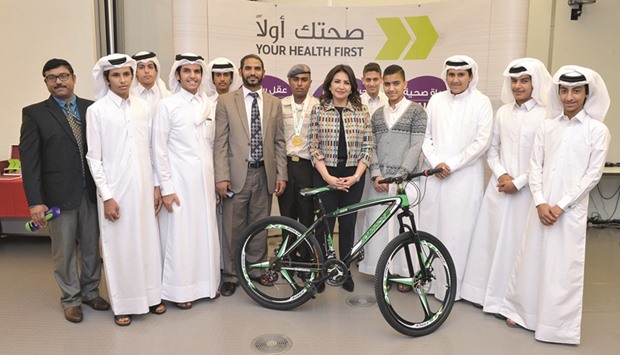Hundreds of children have been inspired to research healthy lifestyles, and spread the word among their friends through the Sahtak Awalan Poster Competition.
The annual competition is part of Weill Cornell Medicine-Qatar’s (WCM-Q) Sahtak Awalan: Your Health First campaign. This year 33 schools from across Qatar and hundreds of children created around 400 health-related posters.
Faculty and experts from WCM-Q and the Ministry of Public Health judged the top 10 posters from the nine winning schools.
Salah Eddeen Al Ayoubi Independent Preparatory School for Boys came first, Al Shahaniya Preparatory Secondary School for Boys won second place, and Osama Bin Zaid Independent School for Boys came third.
The children who created the top 10 posters all received a bicycle as prize.
The competition aimed to encourage young people to take responsibility for their own learning, to understand positive health behaviours and spread that knowledge among their peers.
Nesreen al-Rifai, chief communications officer at WCM-Q, said: “All of these young people have excelled themselves. The creativity and thirst for knowledge are amazing and I would like to congratulate each and every one of them along with their teachers. These are the future leaders of Qatar and they now have a deep understanding of how to keep their mind and body fit and healthy.”
Bandar Saeed al-Qahtani from Salah Eddeen Al Ayoubi Independent Preparatory School for Boys, said the school produced a number of posters on the topics of smoking, obesity and the sun’s ultraviolet rays. The students used marketing techniques to ensure their posters stood out and were read by their classmates.
Other poster topics included road safety, physical exercise, sugary drinks, traffic accidents, nutrition and vitamin D.
Faleh Zayed and Mohamed Shaban of Al Shahaniya Boys School researched road accidents for their poster.
They said: “There are too many accidents in the country and people are suffering. We want to tell people not to drive fast, to use their seatbelts and to concentrate on driving, not, for example, using their phone.”
Ghada Ehab of Hammad International Development School, created a poster about hidden sugar in food and drink. She said: “Now a lot of people have obesity and diabetes so people have to take care of their health by watching the amount of sugar they eat.”

WCM-Q chief communications officer Nesreen al-Rifai (centre), with teachers and students from some of the winning schools.
